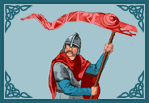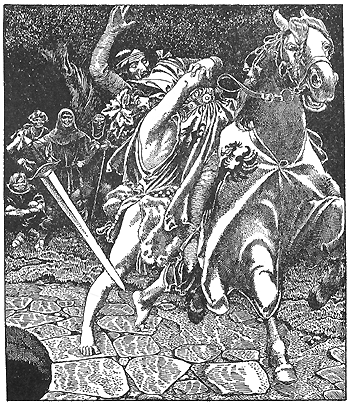 |
 |
|||
|
|
Sir Kay was the son of King Uther's friend, Sir Ector, and therefore became the foster-brother of the young King Arthur who joined the household as a baby in order to keep him safe from would-be assassins. The two grew up together. In his late teens, Kay entered a London tournament, with Arthur acting as his page. The latter pulled the prophetic sword from the stone at the event and Kay tried to claim the credit until his father discovered the truth. With Arthur subsequently being crowned High-King of Britain, Kay rose to prominence at the royal court. He is said to have had mystical powers which must have come in handy in his new position as the King's steward and Count of Anjou. He was called one of the 'Three Enchanter Knights of Britain' for "nine nights and nine days his breath lasted under water, nine nights and nine days would he be without sleep. A wound from Cai's sword no physician might heal. When it pleased him, he would be as tall as the tallest tree in the forest. When the rain was heaviest, whatever he held in his hand would be dry for a handbreadth before and behind, because of the greatness of his heat, and, when his companions were coldest, he would be as fuel for them to light a fire". With Sir Bedivere, Sir Kay had many adventures, including killing both the Giant of St. Michael's Mount and Wrnach the Giant. He rescued Mabon and was one of the party who helped rescue Queen Guinevere from the clutches of Sir Meleagant, as depicted on the Modena Archivolt. He bravely stole the beard of Dillus the Bearded but Arthur made up an insulting song about this and the two fell out over it. It was Kay who persuaded Queen Guinevere to retire from the World and enter a monastery. He did well in the War against Imperial Rome, but was killed by King Sertorius of Libya at the Battle of Soissons; or possibly by Arthur's man, Gwyddawg, who may have joined Mordred's rebellion. Kay was buried at Caen or Chinon. Kay rarely comes across in a good light. He cajoled other knights, abused women, talked his way into adventures at which he usually failed, and spitefully sent inexperienced knights out on dangerous quests only to see them return in a hail of glory. He once persuaded his foster-brother to let me rescue Guinevere from King Meleagant and ended up imprisoned himself. Sir Kay's early appearances in the Mabinogion attached tale of 'Culhwch and Olwen' and other early Welsh sources, suggest that he may have been based on an historical man, traditionally a Lord of Caer Goch in Pembrokeshire, whose family originated in Ireland.
|
|||
| © Nash Ford Publishing 2001. All Rights Reserved. | ||||





 Sir Kay
Sir Kay